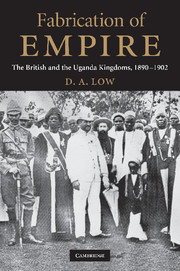Book contents
- Frontmatter
- Contents
- Preface
- List of abbreviations and locations
- Sketch maps
- 1 Prologue: survey and agenda
- 2 Statecraft: external intrusion and local dominion
- 3 Ferment: conversion and revolution in Buganda
- 4 Upcountry: might-have-beens and the Buganda/Uganda outcome
- 5 Warbands: new military formations and ground level imperialism
- 6 Paramountcy: Toro, Busoga and the new overlords
- 7 Defeat: Kabalega's resistance, Mwanga's revolt and the Sudanese mutiny
- 8 Succession: Nkore and the war of Igumira's eye
- 9 Dénouement: aggregations and rulerships
- 10 Government: colonial settlements and the Buganda model
- 11 Capstone: honour, awe and imperialism
- 12 Round up and review
- Select bibliography
- Index
8 - Succession: Nkore and the war of Igumira's eye
Published online by Cambridge University Press: 04 July 2009
- Frontmatter
- Contents
- Preface
- List of abbreviations and locations
- Sketch maps
- 1 Prologue: survey and agenda
- 2 Statecraft: external intrusion and local dominion
- 3 Ferment: conversion and revolution in Buganda
- 4 Upcountry: might-have-beens and the Buganda/Uganda outcome
- 5 Warbands: new military formations and ground level imperialism
- 6 Paramountcy: Toro, Busoga and the new overlords
- 7 Defeat: Kabalega's resistance, Mwanga's revolt and the Sudanese mutiny
- 8 Succession: Nkore and the war of Igumira's eye
- 9 Dénouement: aggregations and rulerships
- 10 Government: colonial settlements and the Buganda model
- 11 Capstone: honour, awe and imperialism
- 12 Round up and review
- Select bibliography
- Index
Summary
With its border region of Kabula becoming a regular stamping ground of Kintu and Mwanga's following, particularly during 1898, one of the by-products of the British suppression of Mwanga's revolt was the extension of British colonial supremacy over Nkore. (For pre-colonial Nkore, see Map 5.) Although less powerful than Rwanda to its south or Buganda to its northeast, and subject to major raids by the former and previously to many raids by the latter, Nkore had hitherto maintained a sturdy independence. Only once previously had it ever been conquered: for about three years around two centuries earlier by Bunyoro. It nevertheless succumbed to British domination between 1898 and 1901 without any armed resistance. This no doubt was largely due to a keen appreciation on the Nkore side of the greater coercive power of the British, but due weight needs to be given too to the political skills of one or two Nkore notables. Since armed suppression did not occur, the trauma that followed upon the loss of sovereignty was somewhat tempered, while the readiness of the British to treat Nkore as subordinated kingdom rather than conquered territory left it just enough room for a negotiated settlement. There were, moreover, winners as well as losers in Nkore, together with two bonuses. Despite, by 1901, losing some important territory to Buganda, it had at the instance of the British greatly increased in size, and acquired a status more akin to its powerful Buganda neighbour than ever before.
- Type
- Chapter
- Information
- Fabrication of EmpireThe British and the Uganda Kingdoms, 1890–1902, pp. 215 - 248Publisher: Cambridge University PressPrint publication year: 2009



